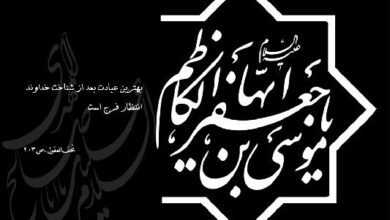The 4th Imam, Imam Sajjad, Ali Zain ul Abideen(as)

The 4th Imam, Imam Sajjad, Ali Zainul Abideen(as)
When Imam Sajjad (as), was born, the world became happier for he would split the earth’s fountain of knowledge and wisdom. Imam Sajjad (as) would also provide magnificent examples of self-negation, renunciation of the world, and adherence to Allah through his behaviour. The Holy Prophet, may Allah bless him and his family, announced the birth of this wonderful baby, and his family was overjoyed to welcome Him home. The news of Imam Sajjad’s (as), birth delighted all the companions who had cordial relationships with the Ahle Bait.
Imam Sajjad (as)’s entire life has been marked by misfortune and suffering. One among them was the fact that His mother passed away while He was a little child in the cradle.
The Birth Rituals of Imam Sajjad (as)
Imam Ali (as), the Commander of the Faithful, peace be upon him, or Imam Hussai n, peace be upon him, raced to conduct the religious birth rituals for the blessed Imam Sajjad (as); He pronounced the azan in His right ear and the iqama in His left year. By doing this, He created a temple in his heart that beat with piety and justice. They were upbeat songs that encouraged him to be kind and do good actions.
The greeting Allahu Akbar (Allah is Great) was given to Imam Sajjad (as), as soon as He arrived! These comments left an impression on His heart and senses, becoming some of Imam Sajjad (as) character traits. Following the revered Islamic Sunna, His father chopped His hair on the seventh day of his birth, slaughter a ram for him (at the a’qiqa rite), and offered silver or gold equivalent to the weight of the animal as alms to the needy and impoverished.
The Place of Imam Sajjad (as) Birth
The Historians have different ideas about the location of Imam Sajjad (as), birth. What they have mentioned is as follows:
(A) Ku’fa is where He was born. (Volume 1, page 104 of Shadharat al-Dhahab).
(B) Medina is where He was born. Al-Fusul al-Muhimma, p. 187, Ibn al-Sabbagh.
His birthplace was Ku’fa. This is so that it is clear that Imam Sajjad (as) was born two years before the passing of His grandfather, the Commander of the Faithful, peace be on him, as both the narrators and historians have noted. (P. 109 of Akhbar al-Diwal).
Imam Hussain (as), his family, and Imam ‘Ali, the Commander of the Faithful, peace be upon him, were unquestionably present at Ku’fa. During His time in power, none of them resided in Medina.
What Time Imam Sajjad (as) Was Born
Imam Sajjad (as) was born in the year 38 A.H. on the fifth day of Shaban (Ibn al-Sabbagh, al-Fusul al-Muhimma, p. 212). This occurred on Thursday.Nur al-Abbsar, page 136.
His Name
The greatest Prophet, may Allah bless him and His family, named His grandson ‘Ali bin Hussain (as) and gave Him the last name Zain al Abidin, according to all historians and narrators. That was one of the beautiful indicators of His prophecy, and it happened 10 years before he was born. On His authority, the tales have repeatedly been reported. Some of them are as follows:
- According to the great Companion Ja’bir bin ‘Abd Allah al-Ansa’ri,
“While I was sitting with Allah’s Apostle, may Allah bless him and his family, He placed Imam Hussain (as) on His lap and played with him before saying, “Ja’bir, a son will be born for Him, and the son will be called ‘Ali. On the Day of Judgement, someone will yell, “Let Sayyid al-‘Abidin (the Lord of Worshippers) rise.” So, His son will get to His feet. Then He will have a son, and the child will be called Mohammed. Say my greetings to him when you see him.
In addition to meeting Imam Mohammed al-Baqir, peace be upon him, Ja’bir also announced this custom and recited these greetings to him, to the joy of the latter.
- According to al-Hafiz b. asakir, who spoke on the authority of Sufya’n b. ‘Ayyina and b. al-Zubayr,
Ali bin al-Hussain (as) arrived when we were (seated) with Ja’bir. Imam Husain (as) visited Allah’s Apostle, may Allah bless him and his family, when I was (sitting) with him, Ja’bir stated. Imam Husain (as) was hugged, kissed, and seated next to the Holy Prophet (pbuh), who then declared: “A son will be born for this (al-Hussain), and on the Day of Judgement, a caller will cry out, “Let Sayyid al-‘Abidin (the Lord of worshippers) rise up, and He will stand up.”p. 142) (Tarikh Dimashq, vol.
- Sa’id b. al-Musayyab narrated
That the Holy Prophet of Allah, may Allah bless him and his family, on the authority of b. ‘Abba’s, said: “A caller will call out on the Day of Judgement, ‘Where is ‘Ali bin al-Husain?'” I’ll see my grandchild Ali bin al-Hussain emerge from the crowd.(Page 87 of Ilal al-Sharaiya. p. 3 of Bihar al-Anwar, vol. 46).
These are some of the traditions that the Holy Prophet, may Allah have mercy on him and his family, is credited with narrating. They demonstrate that the Holy Prophet gave His grandson Ali the nickname Zain Al Abidin (the ornament of the worshippers) and that the Imam has a significant place in the eyes of Allah, the Glorified.
Imam Sajjad (as)’s Kunya
Imam Zain al Abidin Peace be upon, who received the Kunya of:
One is Abu al-Hussain.
Abu Al Hasan.
Abu Mohammed
Abu Abd Allah
Nicknames He Uses:
Regarding His nicknames, they reflect His high ideals, admirable traits, and devotion to Allah. They also reflect his kind nature. Some of them are as follows:
Zain al-Abidin.
He was given this nickname, Zain al-Abidin, or the Ornament of the Worshippers, by his grandfather, Allah’s Apostle, may Allah bless him and his family. This nickname for the imam was given to him because of His generous adoration of Allah.(Shadharat al-Dhahab, vol. 1, p. 104) Tahdhib al-Tahdhib, vol. 7, p. 306.
He has never had this nickname before or after. He is, in fact, the pride of those who follow Allah, the Glorified, and the ornament of those who adore him.
Sayyid al-Abidin
Sayyid al-Abidin, which means “the Lord of the Worshippers,” is one of his well-known nicknames because he submitted to Allah and obeyed Him, and no one else loved Allah like he did save for his grandpa, the Commander of the Faithful, peace be upon him.
Al-Sajjad
Al-Sajjad, or the one who always prostrated himself in prayer, is one of the saintly nicknames for which he is renowned. He bowed down in prayer to Allah and showed greater obedience to him than the others did. When discussing his father’s unceasing prostration, Imam Abu Ja’far al-Ba’qir, peace be upon him, said: “When ‘Ali b. al-Husayn recounted Allah’s favours towards him, he prostrated himself in prayer. He knelt in prayer (when he) read a verse from the Book of Allah, the Great and Almighty, while in prostration.
He bowed down in prayer when Allah removed a calamity from him that he was frightened of. He bowed down in prayer after completing his required prayers. He was known as al-Sajja’d because of the prominence of the prostration markings on the areas of his body. Ibn Hamma wrote a poem about the Ima’m’s unceasing adoration and prostration.
Some of the poem’s lines are as follows:
Because of his adoration, the Ahle Bait monk was and is now known by the nickname al-Sajja’d.
He fasted during the day in order to repent to Allah, and he performed night prayers during the day.
Therefore, who possesses the strength to carry out his knowledge, his fidelity, and his piety and worship?
Al-Zaki.
Almighty Allah purged him, just as He fully cleansed and removed all impurities from his paternal grandfathers, earning him the nickname “al-Zaki” or the pure one.
Al-Amin
Al-Amin, which means “the trusty one,” is one of his holy nicknames for which he is renowned. Al-Fusul al-Muhimma, p. 187, Ibn al-Sabbagh. 52, Bahr al-Ansab. 137; Nur al-Abbsar).
He, peace be upon him, exemplified this great attribute, therefore he said: “If the assassin of my father left the sword he used to slay him with me, I would give it to him.”
Ibn al-Khiyaratayn
Ibn al-Khiyaratayn, which translates to “the son of the finest two,” is another of his holy bynames for which he is well-known. I am the son of the best two, he said, taking great pride in this moniker. His grandfather, the Apostle of Allah, may Allah bless him and his family, once said: “Allah, the Glorified, has the best two of His slaves; thus, His best one from among the Arabs is Ha’shim, and from among the non-Arabs is the Persians.” He alluded to this statement. (P. 222 of Al-Mubarrad, al-Kamil, vol. Wafayat al-A’yan, vol. 2, p. 429, Ibn Khullakan).
The Death of His Mother
Imam Sajjad ()’s mother passed away while he was a little child from childbed fever, which was the first unfortunate event to happen to Him.
Though he tried his utmost, Imam al-Hussain, peace be upon him, was unable to cure her of this life-threatening condition. She was entirely ravaged by the sickness, losing all of her energy and turning into a corpse. She saw her tiny kid, who was devoid of her love and compassion, with sadness and grief.
She was severely ill with a fever, and she endured excruciating anguish for several days before her soul was taken up to heaven. As a result, she was the most sublime soul to enter paradise. (Page 143 of Al-Mas’udi’s Ithabat al-Wasiya).
One of the simple chapters of virtue, chastity, and modesty came to an end when she passed away. When this magnificent woman passed away, it was a sad day for the Prophet’s family since she stood for honour and morality. She was taken to her final resting place by Imam Hussain, the notable Muslim dignitaries, and a sizable contingent of Muslims.
Her revered remains were interred at Ku’fa. Imam al-Hussain was saddened by the passing of this woman because, even though she did not live a long life, she had lived among them for days like the days of flowers.
When he was still a little child, Imam Zain al-‘Abidin, peace be on him, experienced the loss of his mother. This marked the start of the difficulties and calamities that befell just him.
Imam Sajjad (as)’ Housekeeper
Imam al-Hussain Peace be upon, who asked a pure lady from among his slave-wives to take care of his son Imam Zain al-‘Abidin. Imam Sajjad (as) was well taken care of by this upright woman, who treated him with the same tenderness as a mother would her kid.
The life of Imam Sajjad (as), peace be upon him, was steeped in extreme mystery. He wasn’t informed about his mother’s passing until Imam Sajjad (as) was an adult out of concern that he could get sad and anxious.
Physical Characteristics
The followings are the physical characteristics and character traits of Imam Sajjad (as) described by historians: “‘Ali b. al-Husayn was brown, small, skinny, and compassionate.”(Page 36 of Nur al-Abbsar. Page 109 of Akhbar al-Diwal. p. 192) of Al-Sirat al-Sawi fi Manaqib al-Nabi.
Imam Sajjad (as) lost weight and strength as He aged. This is a result of his continuous adoration of Allah. Additionally, the tragedy of Karbala submerged him in grief and suffering since its terrors followed him until he reached the Highest Companion (that is, Allah).
Imam Sajjad (as) Solitude
The prophetic light radiated from Imam Sajjad (as)‘s face. As a result, the foreheads and faces bowed to his seriousness. The finest Arab poet, Al-Farazdaq, characterised his solemnity in his magnificent ode by saying:
The Kaaba’s corner wall practically encloses the palm of his hand as he approaches it. He is shielded from his dread and takes pains to act humble.
Only when he grins does he talk?
“The beholders were captivated in look at the handsomeness of his face,” Al-Shaykha’ni al-Qa’diri stated.(P. 192, Al-Sirat al-Sawi fi Manaqib Al-Nabi).
Imam Sajjad (as) carried himself with a seriousness akin to that of his great-grandfather, the Prophet of Allah, may Allah bless him and his family. His solemnity was respected by Muslim b. ‘Aqaba, a criminal and bloodthirsty individual who broke all Islamic principles and etiquette. He trembled in terror when he saw the Imam. So he gave him a cordial welcome, treated him well, and showed him respect before telling everyone around him that Ali Zayn al-‘Abidin possessed prophetic traits.




